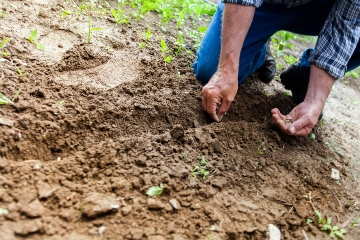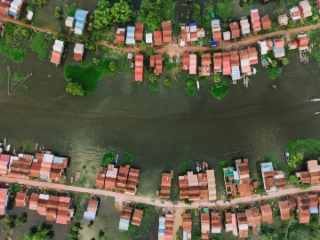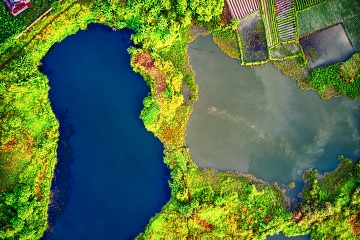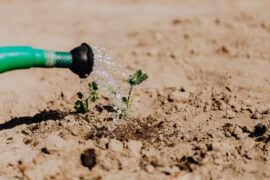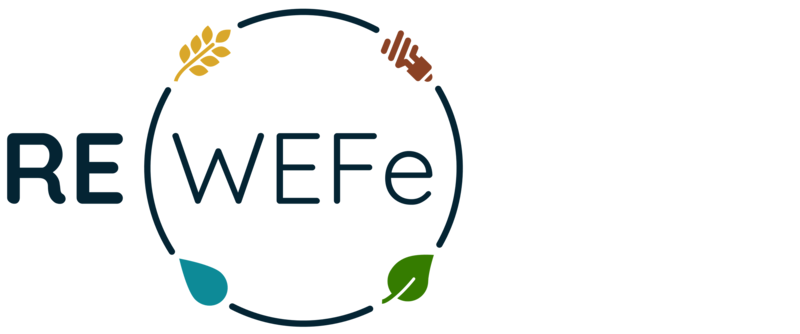
Introduction
With the growing impacts of climate change, accelerated socioeconomic development, and increasing population, demands for water, energy and food will keep rising – putting ecosystems at risk. To address this, it is crucial to consider the synergies and trade-offs within the Water-Energy-Food-ecosystem (WEFe) nexus and maximise mutually beneficial responses to preserve the integrity of all systems. Identifying and quantifying the inter- and intra-linkages between these four sectors is key to designing effective interventions.
However, the quantitative assessment of the WEFe nexus remains largely unexplored. Existing approaches tend to either require substantial resources and data or focus too narrowly on one area, neglecting the broader picture. To fill this scientific gap, the newly developed REWEFe (Rapid Evaluation of the Water, Energy, Food and ecosystem) toooffers a more standardised methodology that can be applied across diverse global contexts, making it accessible to a wide range of stakeholders.
Functionality
The REWEFe tool is a user-friendly, Excel-based application that provides a comprehensive overview of the WEFe nexus within a selected region (referred to as the nexus unit). Its key features include:
- Scenario Development: Allows users to create and analyze scenarios.
- Linkage Insights: Clarifies interactions among water, energy, food, and ecosystem components.
- Decision Support: Facilitates informed decision-making by showing how the WEFe system responds to various changes.
The interface offers easy navigation and interpretation, allowing users with diverse backgrounds and skillsets to conduct analyses independently.
Strengths
- User-Friendly Interface: Operable with basic Excel skills, featuring self-explanatory variable names and a detailed user guide.
- Open Access: Freely available without licensing requirements.
- Flexibility: Easily customizable to add or adjust variables.
- Global Applicability: Designed for diverse geographical contexts.
Main Data Sources
The Input sheet within the tool requires data on land use, water and energy demands, production figures, and ecosystem monetary values. Users can source data from:
- Primary Sources: Field surveys and measurements.
- Secondary Sources: Official statistics, reports, literature, and remote sensing platforms like EarthMap, Google Earth Engine, AQUASTAT, and WaPOR.
Data Analysis and Communication
The REWEFe tool presents results in two tabs:
- Results Tab: Displays absolute and relative changes using bar graphs.
- Sectoral Details Tab: Provides a breakdown of sector-specific subcomponents, showing absolute values, percentage changes, and additional indicators like blue water stress and nutrient stress.
Outputs can be directly extracted from the tool for reports and presentations. Graphs and tables are ready-to-use, and additional customization is possible by exporting table data.
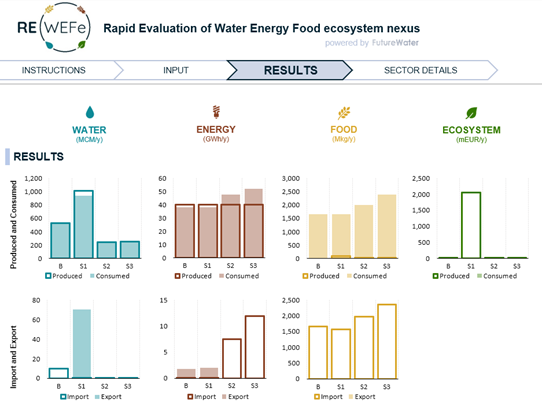
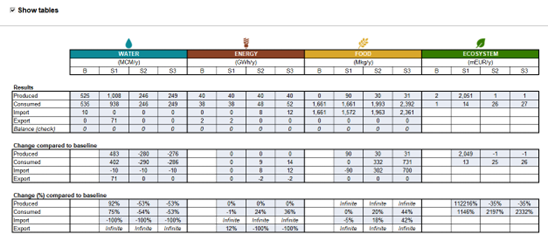
The REWEFe tool empowers practitioners worldwide to better understand and address the complex interdependencies within the WEFe nexus, paving the way for more sustainable and integrated solutions.
Download REWEFe
REWEFE can be accessed after filling in the brief form below. A download link to the tool will then be provided to you by email.
Related publications
-
2025 – User Manual
REWEFe: Rapid Evaluation of the Water Energy Food ecosystem nexus
D’Haeyer, B., T. Imran, G. Simons, P. Droogers
Related projects
-
Shiraka Training Programme on Climate Smart Water in Agriculture
Tunisia is increasingly facing the impacts of climate change, including rising temperatures, prolonged droughts, and erratic rainfall patterns. These changes exacerbate water scarcity, putting pressure on agriculture, ecosystems, and available water supply. To address these challenges, FutureWater, in collaboration with the Shiraka Programme and Tunisian authorities, is conducting two-phase hands-on...
-
Assessment of the Water-Energy-Food-ecosystem Nexus in Selected River Basins in Southeast Asia
FutureWater is tailoring the REWEFe toolkit to support assessment of the WEFE Nexus by quantifying a set of indicators relevant to the key issues in seven selected river basins in Southeast Asia. This is part of a broader baseline assessment of competing uses and users of water in the current...
-
Water Accounting Engine to support decision-making in WEFE Nexus
Effective decision-making in water resource management is often impeded by the fragmented use of diverse approaches among different sectors (water, energy, food and environment). This fragmentation leads to inconsistent data, inefficiencies, conflicting results and challenges in integrated planning. To overcome this, FAO Regional Offices for Near East and North Afri+ca...
-
BONEX: Boosting Nexus Framework Implementation in the Mediterranean
BONEX is a project funded by the PRIMA-EU Foundation specifically for the Mediterranean Region. This region faces several challenges to ensure future food and water security, whilst preserving ecosystems. BONEX explores and develops specific solutions promoting the linking of governance with practice to overcome barriers to WEFE (water, energy, food,...

